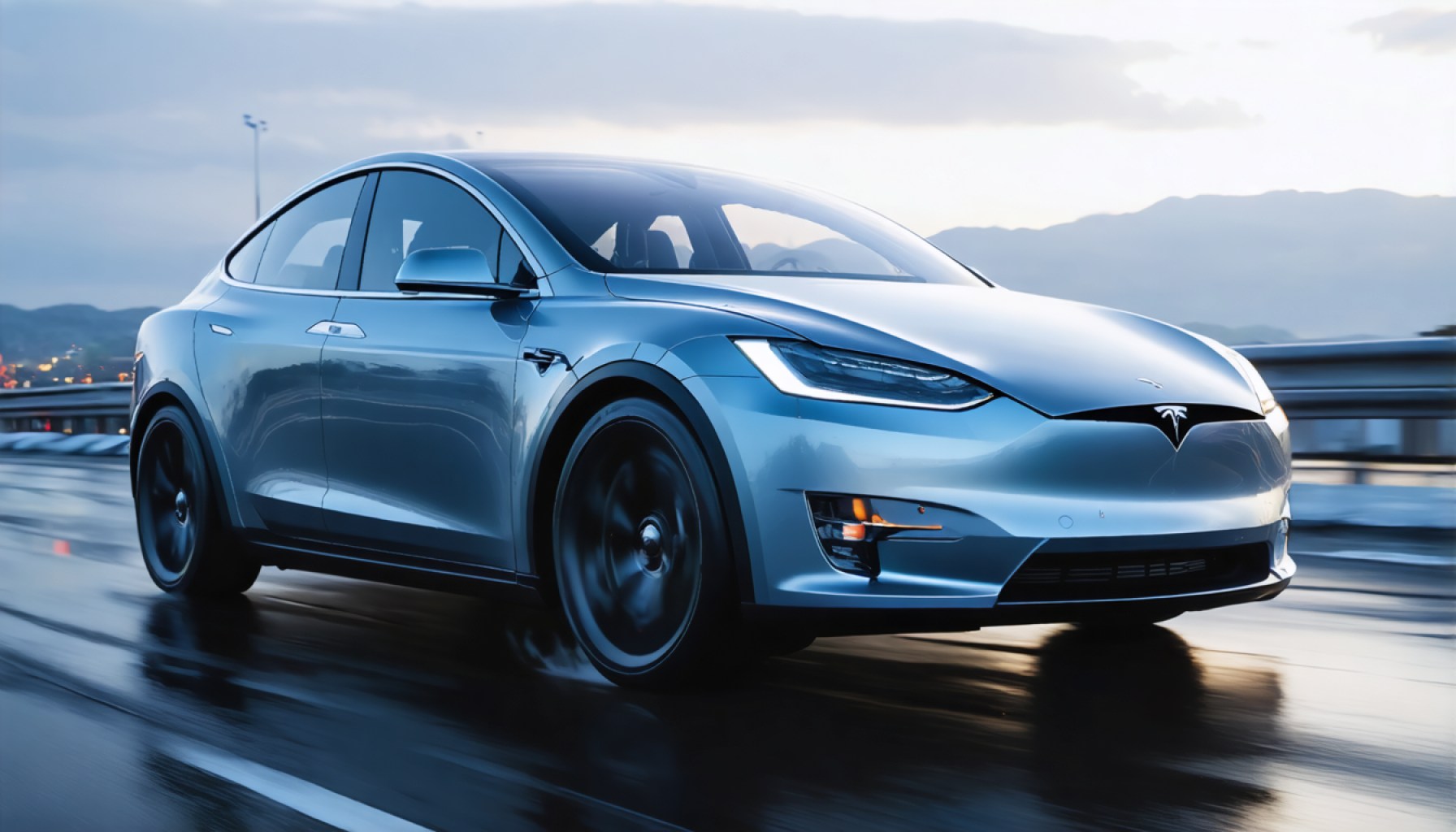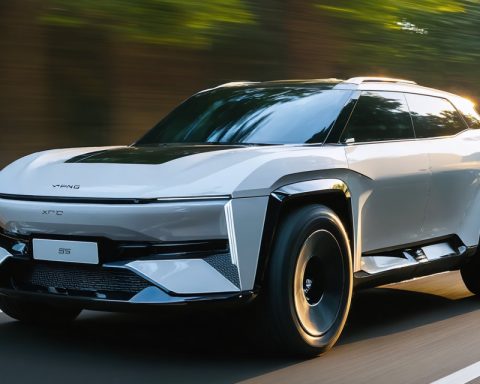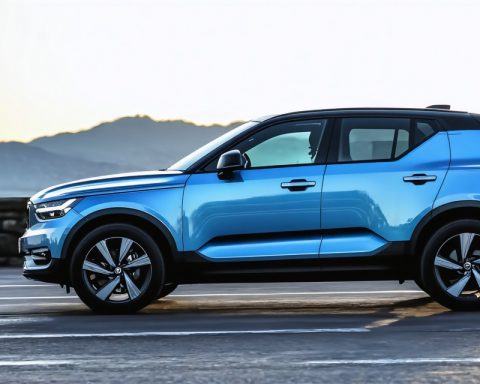- Tesla faces Wall Street uncertainty driven by both CEO Elon Musk’s political actions and fluctuating investor sentiment.
- Despite challenges, Tesla remains a symbol of innovation in autonomous vehicles, AI, and robotics.
- Although it lost the top EV producer spot to BYD, Tesla’s focus on groundbreaking technologies sets it apart.
- Analysts are altering skeptical views, encouraged by Tesla’s advancements in autonomous driving.
- The company’s ventures into AI and robotics position it well to influence industries and sway investor outlooks.
- Success requires visionary leadership and strategic adaptation to market and brand dynamics.
- Tesla strives to overcome external distractions, continually redefining innovation’s potential in the EV market.
Tesla, the electric dynamo that has often seemed impervious to market jitters, finds itself navigating the choppy waters of Wall Street uncertainty once more. This time, the tumultuous seas are stirred not just by CEO Elon Musk’s controversial political overtures, but also by the fickle nature of investor sentiment, increasingly questioning whether Tesla’s innovation prowess can outpace its adversities.
Yet, Tesla’s allure remains formidable. It stands as more than just a car manufacturer; it’s an emblem of futuristic innovation. The investment world watches with bated breath as Tesla leads a revolution spanning autonomous vehicles, artificial intelligence, and robotics. These visionary pursuits are not just buzzwords; they are Tesla’s living reality, captivating investors in search of the future.
Although dethroned as the top EV producer by Chinese rival BYD, Tesla’s ethos is anything but ordinary. It refuses to embroil itself in the ‘commodity cars’ market, preferring to build on groundbreaking technologies that promise transformative impacts. The U.S. market remains a chessboard where Tesla’s strategic play is unrivaled by competitors like BYD’s Seagull, a name unlikely to unsettle Tesla’s foothold.
Industry analysts who have historically observed Tesla with skepticism are revising their outlook in light of its persistent strides. Tesla’s steadfast commitment to innovation has ignited a beacon of optimism, predicting that its advancements in autonomous driving are nearing pivotal milestones. This potential alone turns investor daydreams into calculated wagers on Tesla’s future.
The broader electric vehicle landscape is a whirlwind of competition, yet Tesla stands resolute in its unique intersection of technology and sustainability. Its ventures into AI and robotics reveal a company undeterred by transient setbacks. As these sectors burgeon, Tesla is poised to leverage its expertise, effectively reshaping industries and driving investors to reconsider any bearish stances.
Ultimately, navigating economic storms requires more than cutting-edge technology. It demands visionary leadership and an adaptive strategy that can withstand the tremors of market dynamics and personal brand controversies. In Tesla’s journey, the key question remains: Can the pull of its innovation continue to overcome the drag of external distractions? As Tesla forges ahead, it serves as a testament to the power of innovation, embodied by a brand that endlessly redefines the possible.
Is Tesla Still Leading the Charge in the EV Revolution?
Tesla’s Roadmap to the Future: Insights and Key Takeaways
Tesla has long been a pioneer in the electric vehicle (EV) industry, often defining the cutting edge of automotive innovation. But as it sails through the current market challenges and competition heats up, many wonder if Tesla can maintain its lead amid shifting investor sentiments and market dynamics. Here’s an exploration into Tesla’s standing, its future prospects, and what sets it apart.
How Tesla Maintains Its Innovation Edge
– Autonomous Driving: Tesla’s autonomy features, such as Autopilot, are seen as leading technologies in the race towards self-driving cars. Elon Musk has frequently touted Full Self-Driving (FSD) capabilities, which continue to evolve amid regulatory and safety concerns. According to Tesla, their cars accumulate over a billion miles of data to refine AI driving models continuously.
– AI and Robotics: Tesla’s AI Day showcases have highlighted their commitment to artificial intelligence and robotics. The Tesla Bot, or Optimus, aims to bring robotics into daily life, further demonstrating Tesla’s foray beyond conventional automotive manufacturing.
– Battery Technology: Tesla consistently strives to improve battery efficiency and cost-effectiveness. The widely discussed 4680 battery cells could potentially revolutionize battery production, promising longer range and lower costs.
Market Trends and Industry Forecasts
– Competition: With BYD taking the lead as the top EV producer, Tesla’s market strategy focuses on luxury and performance, categorically differentiating its products rather than diving into lower-end markets.
– Sustainability: Tesla positions itself as a leader not just in automotive innovation but also in sustainability. Initiatives like solar energy solutions and energy storage underscore this commitment.
Pressing Questions and Quick Tips
What Are Tesla’s Main Challenges?
– Market Volatility: Investor sentiments have been unpredictable, influenced by external factors, including global economic conditions and executive controversies.
– Regulatory Hurdles: Autonomous driving technology faces significant regulatory hurdles, compromising timelines for a fully autonomous future.
How Can Tesla’s Investors Navigate Current Uncertainties?
– Diversification remains critical. As Tesla innovates, investors should balance their portfolios and focus on long-term potential rather than short-term market fluctuations.
Real-World Use Cases and Life Hacks
– Tesla Networks: Tesla Supercharger networks ease long-distance travel, addressing one of the major challenges of EV ownership—charging infrastructure.
– Software Updates: Tesla cars receive over-the-air updates, offering new features post-purchase, enhancing car longevity and owner experience without needing new investments.
Controversies and Limitations
– Elon Musk’s Influence: Diversified ventures and outspoken public presence sometimes overshadow Tesla’s technological achievements. Stakeholders must weigh this influence critically when considering investment.
– Ethical Concerns: The push towards automation raises ethical and employment-related issues that Tesla and other tech enterprises are yet to navigate fully.
Conclusion and Recommendations
Tesla stands at the frontier of technological and environmental transformation. Investors and enthusiasts should watch Tesla’s advancements in autonomous technology and battery innovation closely. The company’s ability to adapt to regulatory changes will be key in determining future success.
For current and prospective investors, focus on Tesla’s long-term innovation roadmap and the potential market-scale impacts. Staying informed about the latest Tesla developments and market trends will remain paramount in making informed decisions.
By understanding these aspects, enthusiasts and investors alike can better appreciate Tesla’s complex yet promising journey. Keep an eye on Tesla’s strategies in AI and energy sectors, which could redefine industry standards more broadly.
For more information on Tesla’s latest innovations and strategies, visit Tesla.














